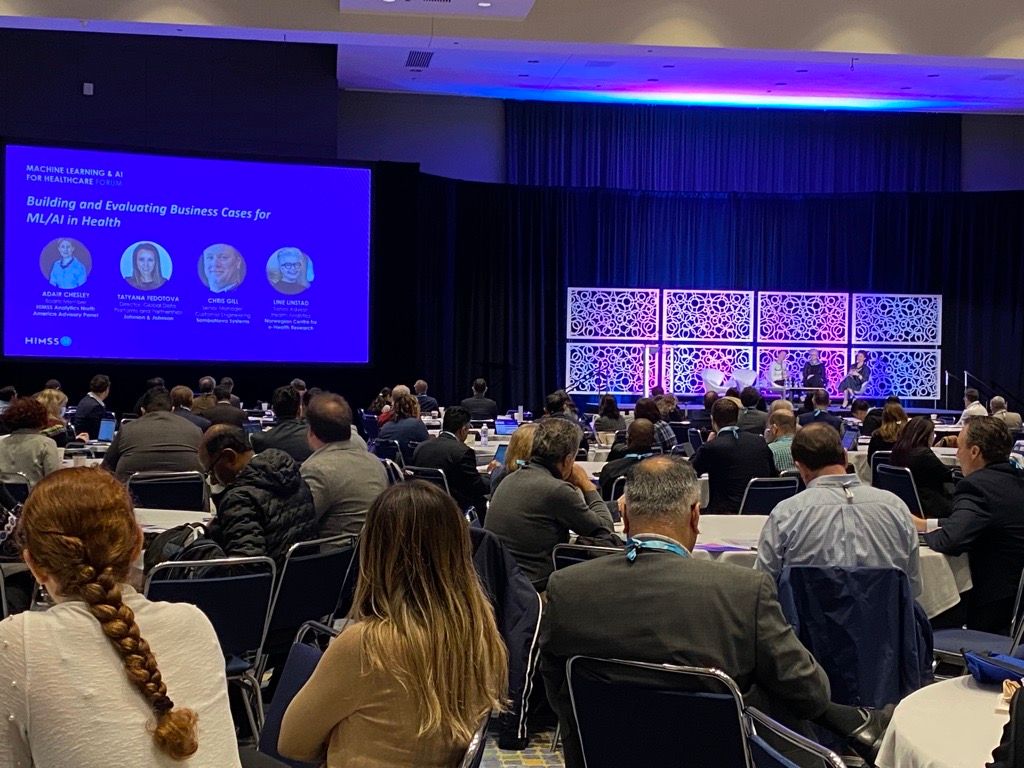AI in healthcare requires ‘approach of exploration’ | HIMSS 2023
Healthcare leaders see great promise and significant challenges with the use of artificial intelligence. But expect AI to be used more and more.
A panel of healthcare leaders discuss artificial intelligence at the HIMSS 2023 Global Health Conference & Exhibition, which began Monday in Chicago. (Photo: Ron Southwick)

Chicago - When it comes to artificial intelligence in healthcare, Chris Gill says it’s clear that the toothpaste isn’t going back into the tube.
Gill, the senior manager of customer engineering at SambaNova Systems, says healthcare organizations are going to have to accept that there are rapid changes coming with AI.
“You’re going to have to get more comfortable in being uncomfortable in this space,” Gill says.
Gill participated in a panel on AI in healthcare on the first day of the HIMSS Global Health Conference & Exhibition, which began Monday morning and runs through the week. Not surprisingly, AI is one of the main topics of the annual conference on healthcare technology.
“The ability to destroy things with this technology is there,” he says. “The ability to create is overwhelming.”
For years, health leaders have predicted that AI is going to transform the delivery of healthcare, and that hype has only accelerated. Researchers are finding promise in AI’s potential to detect risks of complications, such as identifying patients at risk of stroke or hospital patients at risk for delirium.
Still, AI isn’t widely used in healthcare yet, health leaders say. Industry analysts expect that artificial intelligence will play an increasingly important role in healthcare in the not-too-distant future, even as many Americans remain leery of AI in medicine.
In early discussions of AI at the HIMSS Conference, panelists talk about the need to ensure that artificial intelligence improves health equity and doesn’t worsen disparities in outcomes among minority and underserved populations.
“Bias occurs when practices or incorrect assumptions are made anywhere in the back of our mind,” says Sonya Makhni, medical director of Mayo Clinic Platform, who offered a presentation on the opportunities and challenges of AI Monday morning.
“Those assumptions might result in systematic errors," she says. "Systematic errors might skew against certain populations … And this is, of course, a threat to healthcare equity.”
- Read more: Removing racism from health algorithms
The Mayo Clinic Platform provides a database of 10 million de-identified patient records, including 1.3 billion lab results. The platform also evaluates AI models to identify bias.
Tatyana Fedotova, director of global data, platforms, and partnerships in Johnson & Johnson, says data quality is essential in expanding the use of AI.
“For us, data is the backbone,” Fedotova says. “The high quality of the data is absolutely important.”
Healthcare organizations and companies need to approach AI with an open mind, Gill says, explaining, “We’re talking about technology that’s evolving.”
Gill suggested healthcare companies need to develop AI champions in their business. It’s also important to understand that some efforts with AI may not yield immediate success.
“You also have to have an approach of exploration in these things,” Gill says.
Line Linstad, senior advisor of health analytics for the Norwegian Centre for E-health Research, stressed the importance of having clinicians heavily involved in the use of AI.
“Bring all the stakeholders together and be flexible,” Linstad said.
Gill mentioned that big healthcare companies have research arms and core business arms. Driven by AI, “those lines are going to blend in a hurry,” he said.
The iterative approach to AI is happening right now, he says. The explosive popularity of ChatGPT is a case in point, reaching 100 million users in a matter of weeks.
Again, Gill points to the need to be bold and begin experimenting with AI, even if some of those efforts need to be undertaken with some degree of caution.
“You’re going to have to get comfortable trying things out,” Gill says. “Find a way to sandbox these experiments and let them grow.”
Adair Chesley, a member of the HIMSS Analytics North America Advisory board and a moderator of a panel on AI, mentioned another recurrent theme in discussions of expanding AI: collaboration.
“You can’t do it by yourself,” Chesley says.
Children’s hospitals face complex challenges dealing with disasters
April 18th 2025Pediatric hospitals deal with different factors in weather-related events and other emergencies. Terri Wilson of the Children’s Hospital Association talks about the challenges and the need for more planning and support.
Telehealth faces a looming deadline in Washington | Healthy Bottom Line podcast
February 12th 2025Once again, the clock is ticking on waivers for telemedicine and hospital-at-home programs. Kyle Zebley of the American Telemedicine Association talks about the push on Congress and the White House.
Why Sutter Health and SCAN Group are teaming on Medicare Advantage
April 14th 2025They have formed a partnership to offer more products and are looking to create a joint MA plan. We talked with leaders from Sutter and SCAN about the collaboration and why they say it can lead to better care for seniors.